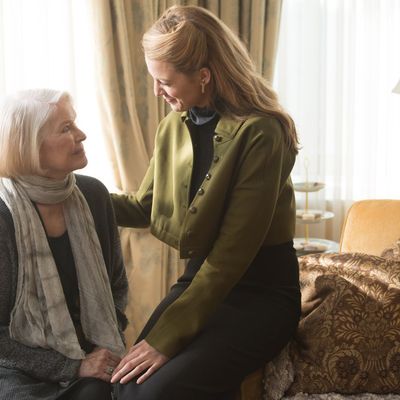
On its surface, The Age of Adaline may look like what might happen if Nicholas Sparks wrote The Curious Case of Benjamin Button. But this strange little love story turns out to be the opposite of those Sparks swoon-fests, for better and for worse; in those films, effective, entertaining romance is generally undone by harebrained plotting and tonal mishmash. The Age of Adaline, for its part, delivers the twists and turns of its fantastical plot with elegance and confidence. Here, the weak romance threatens to bring everything down.
The film offers us the story of a young woman, Adaline Bowman (Blake Lively), born on New YearÔÇÖs Day in San Francisco in 1908, who loses the ability to age after a freak car accident and lightning strike. (Cutely verbose narration informs us that the specific scientific phenomenon that explains this wonÔÇÖt be discovered until 2035.) So, Adaline remains in her late 20s, even as the world advances around her. That causes more problems than you might think: She canÔÇÖt get too attached to her lovers, or even her friends; she has to change her name and identity every few years; ex-classmates, now a lot older, recognize her and freak out; in the 1950s, the FBI starts to hound her because they think she might be a spy; she has an album filled with photos of pet pooches that have died; her daughter grows up to become an old woman, played by Ellen Burstyn. The good news is she canÔÇÖt die, sheÔÇÖll always be harrowingly beautiful, and sheÔÇÖs owned stock in Xerox since the companyÔÇÖs inception. (ÔÇ£IÔÇÖm patient,ÔÇØ we see her telling her banker, in flashback.)
But the film wants to be a breathless romance, and so most of it is set in the present day, when Adaline, now called Jenny and working for the San Francisco city archive, is wooed by a hunky, rich, soulful playboy named Ellis (played by┬áGame of Thrones┬áand┬áOrphan BlackÔÇÖs Michiel Huisman). Our heroine resists his advances, but heÔÇÖs too perfect; he even shares her interest in forgotten San Francisco history. Then, he takes her home to meet his parents ÔÇö and dad (Harrison Ford) turns out to be one of AdalineÔÇÖs brokenhearted former lovers. The moment where this seemingly content, aging family man sees his lost love again ÔÇö as fresh and beautiful as the day he met her ÔÇö is probably the filmÔÇÖs most exciting, beautiful scene; we forget how good Harrison Ford can be at being bewildered.
But the romance between Huisman and Lively is supposed to be the central attraction here, and while they are both supremely attractive, itÔÇÖs hard to buy them as a couple ÔÇö in part, because their interactions turn mostly on Adaline/JennyÔÇÖs withholding nature. ItÔÇÖs baked into the plot that these two characters canÔÇÖt really get to know each other, at least at first. So their ensuing romance feels more like narrative convenience than anything else. They go through the motions of affection, and they look great doing it, but we donÔÇÖt really feel anything.
Still, thereÔÇÖs so much in┬áAge of Adaline┬áthat works that you almost want to cut it some slack for the stuff that doesnÔÇÖt. Lively brings real poise and depth to a tough character: Her cool, calm delivery betrays years spent masking inner hurt. (I was reminded of Robin WrightÔÇÖs chilly but vulnerable Claire Underwood in┬áHouse of Cards.) Ford is better than heÔÇÖs been in ages, and itÔÇÖs nice to have him back; itÔÇÖs nice to see him┬ásmile┬áagain. Director Lee Toland Krieger, whose previous films┬áThe Vicious Kind┬áand┬áCeleste & Jesse Forever┬ádisplayed both an elegant sense of atmosphere and focused performances, has fun jumping among the decades, and he does a solid job keeping the tone just playful enough that we donÔÇÖt ask too too many questions of the silly premise. But┬áThe Age of Adaline┬áhas a fundamental weakness: The tepid romance is supposed to structure everything else, so the film feels disjointed ÔÇö a series of good, sometimes even great scenes in search of an organizing principle. You walk out of the film pleased, but unmoved.


